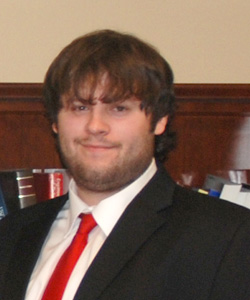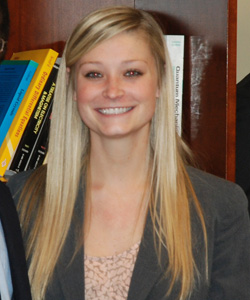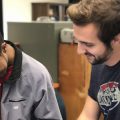Matthew Powers Herring
Matthew Herring is working to make a positive impact on the university, the electrical engineering profession and society. He has served the school as an orientation counselor for several years and has been a leader in student professional and honor societies. He was a coauthor of “Development of the MissSAT Pico-Satellite,” presented at the Mid-South Annual Engineering and Sciences Conference, and he has worked for the school as a student assistant network administrator and for Miltec Research and Technology as an embedded engineer intern.
Hometown: Oxford
Area of Study: Bachelor of Science in Electrical Engineering with an emphasis in computer and RF & wireless engineering
Classification: Senior
Hobby: Robotics
What qualities do you believe a successful engineer should possess?
“In my opinion, successful engineers or scientists are first and foremost professional and honest. If they are not professional or honest, then it would be difficult to entrust them with any type of project to work on. Professionalism is a key role to being successful in any type of field one chooses to go in. Successful engineers or scientists also have to be reliable, dependable and personable. They need to be able to clearly communicate their ideas, thoughts and criticisms with others effectively.”
What are your plans after graduation?
“After graduation, I plan on getting a job with a public, private or government entity doing electrical engineering and/or software engineering and development work. I also have aspirations to get a master’s degree in electrical and/or computer engineering from an accredited school after working a couple of years in the industry.”
What advice would you give to freshmen interested in majoring in electrical engineering?
“My advice to freshmen would be to never ever give up, even if you do not think you are going to make it. I know that engineering can be hard, no matter what discipline you choose to study, along with balancing other aspects of your life, but if you are willing to put forth great effort in everything you do, then I assure you that you will be rewarded. I have to say the secret to my success here at Ole Miss was that I never gave up. I kept on pushing forward no matter how bad things were around me.”
Why did you become interested in electrical engineering?
“To be honest, I sort of ‘fell’ into electrical engineering. I knew that, even when I was little, I wanted to be an engineer. The engineer I wanted to be back then was a locomotive engineer, not an actual engineer as I am today. The day of my freshman orientation I was actually signed up as a chemical engineering student. I had previously taken courses from the university and the School of Engineering during my senior year of high school through the Summer College program. I took ENGR 100, which introduces students to all the different branches of engineering that the university offers to its students. I was particularly interested in electrical and mechanical but was still on the fence about these two areas until the day of orientation. When I signed up for the advising period for the electrical and mechanical departments, it just so happened that the electrical appointment was first. Once I met with Dr. Richard Gordon and we talked about electrical engineering, it just seemed to be a better fit to me than mechanical. After that day, I was declared electrical, and I haven’t looked back since. I have to say it was probably one of the luckiest accidents of my life.”
Kelly Elizabeth Dick
Kelly Elizabeth Dick is known for her eye for detail in lab and field work, and her upbeat personality, said Joel Kuszmaul, chair and associate professor of the Department of Geology and Geological Engineering.
“She had very strong observational skills, which are very important in geology,” Kuszmaul said. “Kelly was also unusually strong in group work in the lab or field, helping others when she had already mastered topics.”
Hometown: Hitchcock, Texas
Area of Study: Geology
Classification: Senior
How did you become interested in geology?
“I have wanted to be a geologist for as long as I can remember. My love for this field started when I found out that my father studied geophysics at Stanford, and that three of my grandparents studied geology or engineering. My grandmother was one of the first women in the geology program at the University of Texas, and my grandfather studied electrical engineering at Harvard and then received his master’s at Stanford. I have received a lot of guidance from them, as well as support and understanding.”
What does it take to be a great scientist?
“Some qualities of a successful scientist are the willingness to learn, as well as open-mindedness and economic viability. Other qualities to be successful are optimism, open communication and hindsight. Professionalism plays a role in being successful by having good ethics, honesty and loyalty to your employer.”
What are some helpful tips for the freshman class entering the School of Engineering?
“You do not have to be brilliant to do well. It takes hard work and a lot of extra time outside the classroom. Pay attention in your classes because you can learn a lot in the classroom. Also, be willing to talk to your professors and ask them questions because they want to help and have their students succeed in the School of Engineering. If you study hard and listen in class, you can end up making good grades and even excel in your classes by understanding the material. You can learn any subject by hard work and dedication.”


